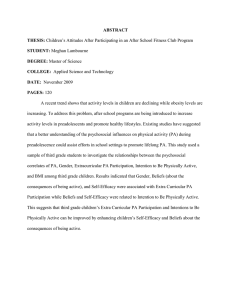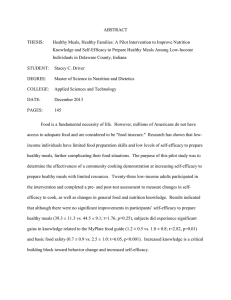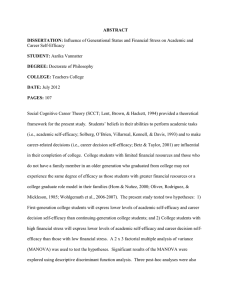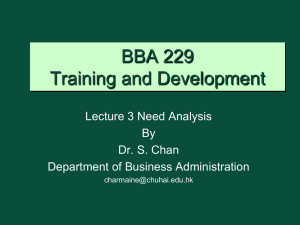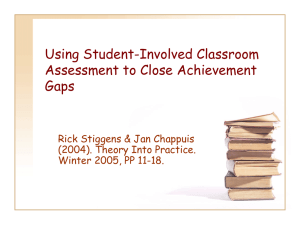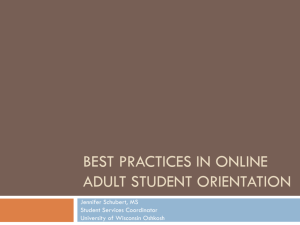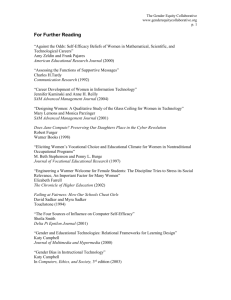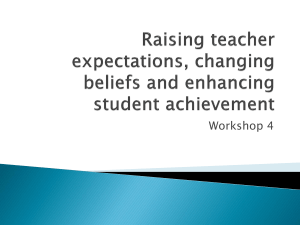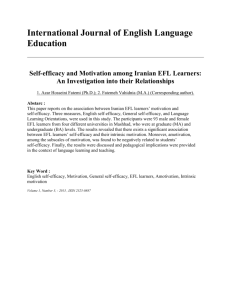Project Title: Successful Academic House Advisors Name & Institution:
advertisement
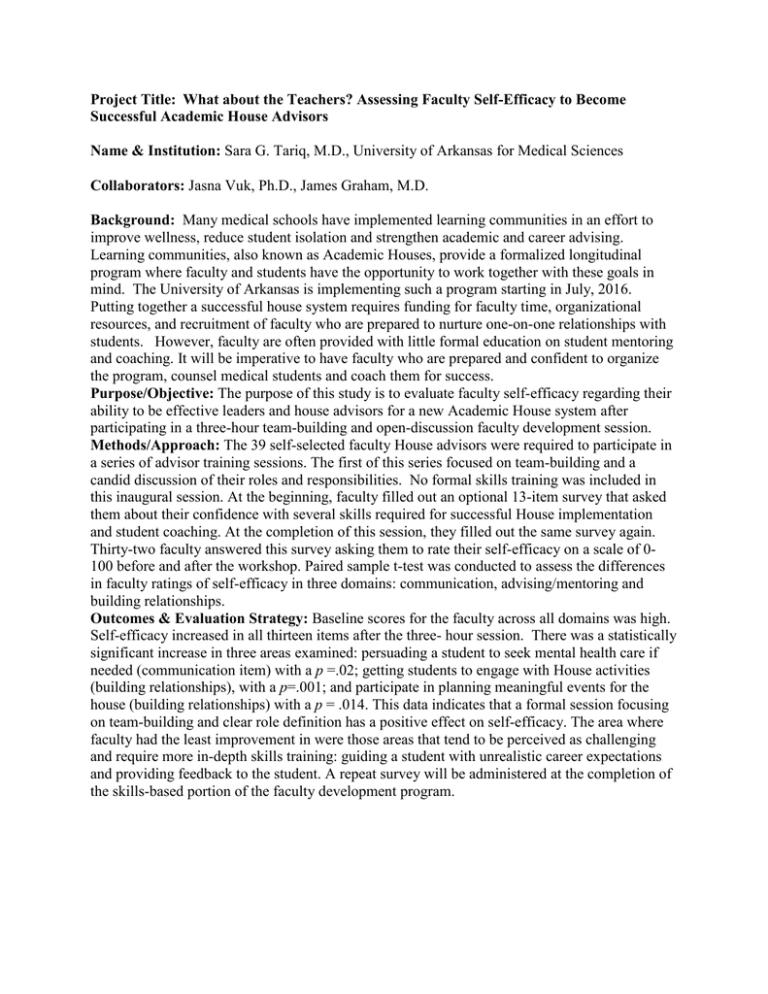
Project Title: What about the Teachers? Assessing Faculty Self-Efficacy to Become Successful Academic House Advisors Name & Institution: Sara G. Tariq, M.D., University of Arkansas for Medical Sciences Collaborators: Jasna Vuk, Ph.D., James Graham, M.D. Background: Many medical schools have implemented learning communities in an effort to improve wellness, reduce student isolation and strengthen academic and career advising. Learning communities, also known as Academic Houses, provide a formalized longitudinal program where faculty and students have the opportunity to work together with these goals in mind. The University of Arkansas is implementing such a program starting in July, 2016. Putting together a successful house system requires funding for faculty time, organizational resources, and recruitment of faculty who are prepared to nurture one-on-one relationships with students. However, faculty are often provided with little formal education on student mentoring and coaching. It will be imperative to have faculty who are prepared and confident to organize the program, counsel medical students and coach them for success. Purpose/Objective: The purpose of this study is to evaluate faculty self-efficacy regarding their ability to be effective leaders and house advisors for a new Academic House system after participating in a three-hour team-building and open-discussion faculty development session. Methods/Approach: The 39 self-selected faculty House advisors were required to participate in a series of advisor training sessions. The first of this series focused on team-building and a candid discussion of their roles and responsibilities. No formal skills training was included in this inaugural session. At the beginning, faculty filled out an optional 13-item survey that asked them about their confidence with several skills required for successful House implementation and student coaching. At the completion of this session, they filled out the same survey again. Thirty-two faculty answered this survey asking them to rate their self-efficacy on a scale of 0100 before and after the workshop. Paired sample t-test was conducted to assess the differences in faculty ratings of self-efficacy in three domains: communication, advising/mentoring and building relationships. Outcomes & Evaluation Strategy: Baseline scores for the faculty across all domains was high. Self-efficacy increased in all thirteen items after the three- hour session. There was a statistically significant increase in three areas examined: persuading a student to seek mental health care if needed (communication item) with a p =.02; getting students to engage with House activities (building relationships), with a p=.001; and participate in planning meaningful events for the house (building relationships) with a p = .014. This data indicates that a formal session focusing on team-building and clear role definition has a positive effect on self-efficacy. The area where faculty had the least improvement in were those areas that tend to be perceived as challenging and require more in-depth skills training: guiding a student with unrealistic career expectations and providing feedback to the student. A repeat survey will be administered at the completion of the skills-based portion of the faculty development program. What about the Teachers? Assessing Faculty Self-Efficacy to Become Successful Academic House Advisors Sara G. Tariq, M.D., Jasna Vuk, Ph.D., James Graham, M.D. BACKGROUND METHODS RESULTS Many medical schools have implemented learning communities in an effort to Thirty-nine self-selected faculty House advisors enrolled in a series of training sessions focusing on team-building and skills acquisition. The first of this series focused on: Average ratings on the pre-survey ranged from 70.6 to 90.16. Self-efficacy increased in all thirteen items after the three-hour session. There was a statistically significant increase in three of the thirteen items: • Persuading a student to seek mental health care if needed (communication: p =.02) • Motivating students to engage with House activities (building relationships: p =.001) • Participating in planning meaningful events for the house (building relationships: p = .014) • Improve student wellness • Promote professional & social development • Strengthen academic and career advising. Learning communities, also known as Academic Houses, provide a formalized longitudinal program where faculty and students have the opportunity to work together with these goals in mind. IMPLEMENTATION • • • • Team-building using the “Marshmallow and Spaghetti Tower Project” Review of the Academic House structure & organization A candid discussion of their roles and responsibilities Feedback from the faculty on specific components of the House structure Thirty-two faculty were asked to fill out an optional 13-item survey that asked them about their confidence with skills required for successful House implementation and student coaching. In this survey, they were asked to rate their level of confidence on a scale of 0-100. The 13 items addressed three different domains: Faculty Self-Efficacy Rating Persuading student to seek mental health Engaging students in house activities Planning meaningful House events 90 The University of Arkansas College of Medicine is initiating an Academic House program beginning July, 2016. Implementing a successful House system requires multiple foundational components that include: • • • • Funding for faculty time & development Organizational resources Leadership support Student buy-in & engagement • Communication • Advising/mentoring • Building relationships 85 80 After the completion of this first session, they filled out the same survey again. Paired sample t-test was conducted to assess the differences in faculty ratings. 75 70 65 Pre Post DISCUSSION ISSUE Student Buy In Presented at 2016 ELAM Leaders Forum Organization & Structure This study examines the success of one “brick” of the faculty development pillar. The purpose of this study is to evaluate faculty self-efficacy regarding their ability to be effective leaders and house advisors for a new Academic House system after participating in a threehour team-building and open-discussion faculty development session. Leadership Support PURPOSE Faculty Development Faculty are often provided with little formal education on student mentoring and coaching. It will be imperative for faculty to be prepared and confident to help organize events, counsel medical students and coach them for success. ACADEMIC HOUSES Strategies for Success Shaded brick represents this research project as part of our overall implementation project for Academic Houses These data indicate that a formal session focusing on team-building and collaborative discussion has a positive effect on self-efficacy. The items where faculty had the least improvement were in those skills that tend to be perceived as challenging for advisors, such as guiding a student with unrealistic career expectations and providing feedback. A repeat survey will be administered at the completion of the skills-based portion of the faculty development program. RESULTS This study is a small part of a college-wide Academic House program that aims to improve academic success, expand student wellness and improve match outcomes. Faculty development sessions will be completed in July, and the faculty and students will start “living in their houses” from August. We plan to evaluate the Academic Houses from the student, faculty and programmatic perspective.
